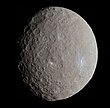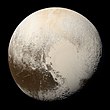(556416) 2014 OE394
Appearance
(Redirected from 2014 OE394)
| Discovery | |
|---|---|
| Discovered by | Pan-STARRS (F51) |
| Discovery site | F51, Haleakala Observatory |
| Discovery date | 28 July 2014 |
| Designations | |
| Classical Kuiper belt object[1][2] | |
| Orbital characteristics[3] | |
| Epoch 31 July 2016 (JD 2457600.5) | |
| Uncertainty parameter 2 | |
| Observation arc | 1452 days (5 oppositions) |
| Aphelion | 51.976 AU |
| Perihelion | 40.805 ± 0.002 AU |
| 46.391 AU | |
| Eccentricity | 0.12040 ± 0.00005 |
| 316 years | |
| 70.25469° | |
| Inclination | 3.93206 ± 0.00008° |
| 308.87986 ± 0.0004° | |
| 259.35897 ± 0.008° | |
| Physical characteristics | |
| 280-540 km[3] 240-730 km[4] | |
| 4.74[5] | |
(556416) 2014 OE394 (provisional designation 2014 OE394) is a large cubewano in the Kuiper belt that was discovered in July 2014 by the Pan-STARRS-1 telescope, and announced on 17 July 2016.[6] It is one of the brighter trans-Neptunian objects, being the 34th brightest cubewano as of 23 July 2016. Its exact size is unknown, but is most likely between 240 and 730 kilometers across.[4] Mike Brown's website lists it as a "possible" dwarf planet, with an estimated diameter of 337 kilometers.[2]
2014 OE394 was observed by the New Horizons probe in September 2017 and August 2018. It passed close by:[7] about 8.7 AU away on 1 January 2017, and 7.5 AU on 1 January 2019.
References
[edit]- ^ Marc W. Buie. "Orbit Fit and Astrometric record for 14OE394". SwRI (Space Science Department). Archived from the original on 28 March 2019. Retrieved 17 February 2018.
- ^ a b Brown, Mike. "How many dwarf planets are there in the outer solar system? (updates daily)". Mike Brown's Planets. Retrieved 24 July 2016.
- ^ a b "IAU Minor Planet Center - 2014 OE394". Minor Planet Center. International Astronomical Union. Retrieved 24 July 2016.
- ^ a b "JPL Small-Body Database Browser". Jet Propulsion Laboratory. NASA. Retrieved 24 July 2016.
- ^ "IAU Minor Planet Center".
- ^ "MPEC 2016-O95 : 2014 OE394". Minor Planet Center. International Astronomical Union. Retrieved 24 July 2016.
- ^ Verbiscer, Anne J.; Helfenstein, Paul; Porter, Simon B.; Benecchi, Susan D.; Kavelaars, J. J.; Lauer, Tod R.; et al. (April 2022). "The Diverse Shapes of Dwarf Planet and Large KBO Phase Curves Observed from New Horizons". The Planetary Science Journal. 3 (4): 31. Bibcode:2022PSJ.....3...95V. doi:10.3847/PSJ/ac63a6. 95.
External links
[edit]


